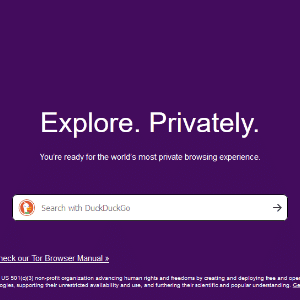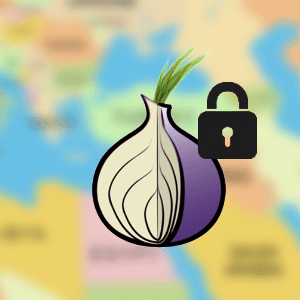Even if you are not doing anything suspicious or illegal, you may feel the need to hide your content and your identity from the thousands of dangerous external agents lurking on the web. If you connect to the Internet under normal circumstances, you will leave traces of your activity and your location that cyber and regular criminals can take advantage of.
That is why there are so many tools to hide your traffic and your IP number. Proxies, Smart DNS, VPNs, and the TOR network can help you have more privacy and a somewhat anonymous Internet experience, depending on each resource and how you use it.
In the specific case of TOR (which stands for The Onion Router,) it is a widely used tool for anonymous browsing in several locations. However, given that it hosts so many “dark” or “dubious” activities, the question appears: Is TOR illegal? Let’s find out.
 What exactly is TOR?
What exactly is TOR?
Tor is a decentralized network that comes in the form of installable software that, once enabled, will allow the user to access the “dark web,” a term coined by the online community to refer to pages and activities that are not commonly found on the usual search engines.
TOR implements a set of nodes, or relays, that will take some time to reach the final destination but will provide anonymity because the communication is set through a random, virtually untraceable path. It means that several devices randomly located across the planet will receive your request and “bounce” it along the network. Each node will only recognize the IP address of the closest devices.
The traffic, if you decide to use TOR, is encrypted, but people can see it when it retrieves data from the endpoint. That is why TOR, while it enhances privacy and provides a more anonymous atmosphere for browsing than Google Chrome, Mozilla Firefox, Safari, and others; does not entirely protect what you do or visit online because people can spy on traffic from the exit nodes.
Is TOR illegal?
We know that you are wondering whether TOR is illegal or if you can use it without restrictions anywhere. The answer is simple: using TOR is perfectly legal. You can even download it for free, and the fact that you hide your IP number is also permitted.
However, TOR has gained attention from law enforcement agencies because not everybody on the dark web is hiding from censorship or are a journalist trying to protect their stories. The fact remains that there are thousands of criminals lurking around the Internet environment, and they have brought their “talents” to the digital platform.
There are numerous cybercriminals that hide under TOR’s anonymity to perform – and here is where the gray area starts – illegal activities such as child pornography, drug dealing, gambling, and others. In fact, studies have shown that the “dark web” hosts nearly 45% of illegal acts or pages.
An important thing to keep in mind when talking about these subjects is that TOR isn’t 100% effective. It may not keep your content completely hidden from law enforcement agencies, and sometimes, it has the opposite effect: since these organizations know that there are many criminals hiding behind TOR’s encryption, the network actually draws their attention.
 VPN, the perfect TOR alternative
VPN, the perfect TOR alternative
An even better anonymity and privacy tool is VPN technology. The word VPN stands for Virtual Private Networks, which are online encryption resources that come in the form of apps and clients. They can reroute the user’s traffic and IP number to remote servers to keep them away from hackers, governmental surveillance, malware developers, online advertising, e-commerce and shops, and even from your Internet Service Provider.
It has been proven time and time again that ISPs are one of the most dangerous “double-edge” swords out there when it comes to your data privacy. They collect logs of your activity, search and browsing patterns and then sell them to the highest bidder, no matter who it is.
VPNs provide privacy and anonymity because they mask your online identity and can lend you another IP address for temporary use. The user can choose to connect to a virtual server from any country, provided that it is included in your brand’s catalog.
TOR is not illegal, but you may be better off using a VPN anyway since the technology isn’t nearly as slow as what TOR implements. Besides, Virtual Private Networks have several security measures and resources that you can’t find on The Onion Router, such as DNS leak protection, double VPN, secure Wi-Fi, kill switches, split tunneling, and more.
IPBurger is gaining steam and is quietly becoming one of the preferred VPN options in the market. It offers both shared and dedicated IP address, it supports streaming and torrenting, it has satisfactory speeds, and it implements robust encryption at very affordable costs, starting with a monthly plan of $5.
In conclusion, given that it hosts so many morally dubious activities on the dark web, you may find yourself wondering whether TOR is illegal. The technology per se is legal, but nearly 45% of the things done under its encryption can get you in legal trouble, so it may be better for you to stay away and use a VPN instead.
 What exactly is TOR?
What exactly is TOR? VPN, the perfect TOR alternative
VPN, the perfect TOR alternative

